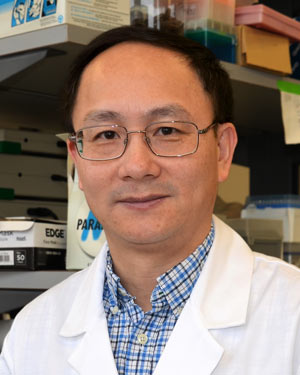Yanqiao Zhang, M.D.

Contact
Phone: 330.325.6693
Email: yzhang@neomed.edu
Office
Room: F-234
Publications
View publications
Appointment
Bio
Dr. Yanqiao Zhang is a Distinguished University Professor in the Department of Integrative Medical Sciences.
He earned his M.D. degree and M.S. degree from Wuhan University School of Medicine. Dr. Zhang completed postdoctoral training at West Virginia University and University of California at Los Angeles.
He joined NEOMED as assistant professor in 2008.
Dr. Zhang has received numerous awards and honors, such as Postdoctoral Fellowship award, Scientist Development award, and Beginning Grant-in-Award from American Heart Association (AHA), George J. Popjak Scholar Award on Atherosclerosis (UCLA), Junior Faculty Award (NEOMED), Fellow of AHA, and Outstanding Research Award (NEOMED). He has published papers in PNAS, Genes and Development, Nature Communications, Hepatology, etc.
Dr. Zhang’s research is currently supported by NIH R01s.
Area of Expertise/Research Interests
Dr. Zhang’s research focuses on understanding the pathogenesis of diseases associated with dysregulation of lipid, bile acid and/or glucose metabolism, such as fatty liver diseases, diabetes, obesity and atherosclerosis, in hoping for identifying novel therapeutic targets or approaches for treatment of these common metabolic disorders.
Courses
- Molecules to Cells (Biological Chemistry)
- Cell Signaling
- Molecular Cloning and Genetic Engineering
Academic & Professional Activities
- Standing member, NIH Hepatobiliary Pathophysiology (HBPP) Study Section (2015-2019)
- Editorial Board, Hepatology (2016 – 2019)
- Academic Editor, Scientific Report (2015 – )
- Program Committee, AHA Scientific Sessions Meeting (2013 – 2015)
- AHA Innovative Award study section (2019 – )
Awards
- AHA Postdoctoral Fellowship Award
- AHA Scientist Development Award
- AHA Beginning Grant-in-Aid award
- George J. Popjak Scholar Award on Atherosclerosis (UCLA)
- Outstanding Research Award (NEOMED)
Distinctions
- Editorial Board, Hepatology, 2016 – 2019
- Academic Editor, Scientific Reports, 2015 –
- Academic Editor, PLoS One, 2013 – 2018
- Standing member, NIH HBPP Study Section, 2015-2019
- Standing member, AHA Lipid and Lipoprotein Study Section, 2010-2014
Presentations
- Wayne State University, Detroit, MI. November, 2019
- University of Pittsburgh, Pittsburgh, PA. January 2019 and November 2018
- 2018 International Meeting on 22nd MDO and 33rd JSSX. Kanazawa, Japan. October 2018.
- Loyola University, Chicago, IL. November 2017
- Southeast Lipid Research Conference, Lexington, Kentucky. November 2017
Publications
- Xu Y, Hu S, Jadhav K, Zhu Y, Pan X, Cassim Bawa F, Yin L, Zhang Y. Hepatocytic Activating Transcription Factor 3 Protects Against Steatohepatitis Via Hepatocyte Nuclear Factor 4α. Diabetes. 2021 Sep 2;. doi: 10.2337/db21-0181. [Epub ahead of print] PubMed PMID: 34475098.
- Xu Y, Zhu Y, Hu S, Pan X, Bawa FC, Wang HH, Wang DQ, Yin L, Zhang Y. Hepatocyte miR-34a is a key regulator in the development and progression of non-alcoholic fatty liver disease. Mol Metab. 2021 Sep;51:101244. doi: 10.1016/j.molmet.2021.101244. Epub 2021 Apr 28. PubMed PMID: 33930596; PubMed Central PMCID: PMC8141777.
- Xu Y, Zhu Y, Hu S, Xu Y, Stroup D, Pan X, Bawa FC, Chen S, Gopoju R, Yin L, Zhang Y. Hepatocyte Nuclear Factor 4α Prevents the Steatosis-to-NASH Progression by Regulating p53 and Bile Acid Signaling (in mice). Hepatology. 2021 Jun;73(6):2251-2265. doi: 10.1002/hep.31604. Epub 2021 May 14. PubMed PMID: 33098092; PubMed Central PMCID: PMC8062586.
- Xu Y, Li Y, Jadhav K, Pan X, Zhu Y, Hu S, Chen S, Chen L, Tang Y, Wang HH, Yang L, Wang DQ, Yin L, Zhang Y. Hepatocyte ATF3 protects against atherosclerosis by regulating HDL and bile acid metabolism. Nat Metab. 2021 Jan;3(1):59-74. doi: 10.1038/s42255-020-00331-1. Epub 2021 Jan 18. PubMed PMID: 33462514; PubMed Central PMCID: PMC7856821.
- Xu Y, Xu Y, Zhu Y, Sun H, Juguilon C, Li F, Fan D, Yin L, Zhang Y. Macrophage miR-34a Is a Key Regulator of Cholesterol Efflux and Atherosclerosis. Mol Ther. 2020 Jan 8;28(1):202-216. doi: 10.1016/j.ymthe.2019.09.008. Epub 2019 Sep 12. PubMed PMID: 31604677; PubMed Central PMCID: PMC6952168.


